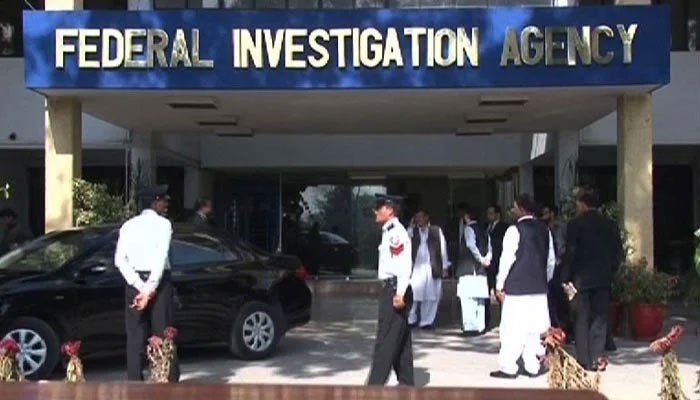Media code
Human rights organisations argue that journalists have fundamental right to report on political developments
The Federal Investigation Agency’s (FIA) Cybercrime Wing has initiated legal action against several journalists and vloggers for their coverage of the PTI protest on November 24. The cases against these individuals have been registered under the Prevention of Electronic Crimes Act (PECA), with the FIA accusing them of spreading fabricated narratives against state institutions and inciting public unrest. Media bodies and human rights organisations have expressed deep concern over these actions, viewing them as a blatant attempt to stifle press freedom and rightly arguing that journalists have a fundamental right to report on political developments, including protests, without fear of retaliation. Unfortunately, the state’s reliance on controversial laws such as PECA and the Punjab Defamation Act to suppress freedom of speech and target dissenting voices has become a recurring theme under the pretext of protecting rights and countering fake news. Recent media reports suggest that the Shehbaz Sharif-led government is planning amendments to PECA to establish a new authority that can block or remove online content and prosecute fake news, among other measures. The proposed Digital Rights Protection Authority (DRPA) bears an unsettling resemblance to the Pakistan Media Development Authority (PMDA) that the PTI government had attempted to introduce. However, it never materialised, thanks to fierce resistance and pressure from media bodies and organisations. At the time, the PML-N and other opposition parties stood firmly against the PMDA, arguing that it aimed to impose state control over all segments of the media through a single, centralised authority. Ironically, now that the PML-N is in power, it appears to be pursuing similar measures to control social media. This stark contrast highlights a sad and familiar pattern: political parties advocate for freedom of expression when in opposition but shift to pro-censorship policies upon gaining power.
While fake news, misinformation, and disinformation are undeniable global challenges with serious repercussions, allowing the state to regulate the media is unlikely to provide solutions and will, instead, exacerbate problems. A state-driven approach to regulating media often becomes a tool to silence dissent and stifle independent journalism. Therefore, it is crucial for the Pakistani media itself to devise a robust code of conduct to address the issues of fake news, misinformation, and disinformation. Journalists who consistently indulge in propaganda and become serial offenders must be held accountable by their peers and media bodies first rather than by the state. Being a journalist in Pakistan is already fraught with challenges. According to the Freedom Network’s Impunity Report 2024, journalists in the country are targeted for their work, sometimes losint their lives in the process. Media practitioners face a host of issues, ranging from censorship, online trolling, and offline harassment to delayed salaries and salary cuts. These threats come from all directions, and they severely hinder the ability of journalists to perform their duties. To paint all media professionals with the same brush because of a few black sheep is unfair and counterproductive to the cause of press freedom. Of course, there are those within the media who exploit their positions to further nefarious agendas, spread lies, endanger lives, and foment unrest. But they are the exception.
To address these issues, media bodies must take meaningful action against such journalists. By holding these individuals accountable, the media can prevent the government from using their actions as an excuse to impose draconian measures. A proactive approach by media organisations could include naming and shaming offenders, imposing fines, and revoking memberships of those who bring disrepute to the profession. In doing so, the media can protect itself from undue state interference and uphold the fundamental principles of press freedom. The formation of a new code of conduct is not just a necessity but an urgent call to action for the media in Pakistan. By addressing the issues within its ranks, the media can safeguard its independence and ensure that it continues to serve as a vital pillar of democracy. At the same time, the government needs to realise that there is nothing heroic in suppressing freedom of the press. Peca was always a problematic law and each government seems bent on making it even worse.
-
 Chris Hemsworth Gets Candid About Daughter’s Drawings That Inspired Several Of His Tattoos
Chris Hemsworth Gets Candid About Daughter’s Drawings That Inspired Several Of His Tattoos -
 UK To Experience Rare 'Blood Rain' On Tuesday Feb. 24, 2026: Know Every Detail
UK To Experience Rare 'Blood Rain' On Tuesday Feb. 24, 2026: Know Every Detail -
 Maria Shriver Shares Heartbreaking Reminder After Eric Dane's Death: 'Next Week Isn't Guaranteed'
Maria Shriver Shares Heartbreaking Reminder After Eric Dane's Death: 'Next Week Isn't Guaranteed' -
 Andrew Mountbatten Windsor Gets New Moniker After Losing ‘Prince’ Title
Andrew Mountbatten Windsor Gets New Moniker After Losing ‘Prince’ Title -
 Jack Black Shares Unseen Moments With Tanya Haden: 'My Love'
Jack Black Shares Unseen Moments With Tanya Haden: 'My Love' -
 Shamed Andrew Made Taxpayers Fund Personal ‘massages’
Shamed Andrew Made Taxpayers Fund Personal ‘massages’ -
 What Could Be Nick Reiner's Fate After Pleading Not Guilty Parents’ Murder Case?
What Could Be Nick Reiner's Fate After Pleading Not Guilty Parents’ Murder Case? -
 Princess Kate Talks About 'hard Conversations' With Kids Amid Andrew Drama
Princess Kate Talks About 'hard Conversations' With Kids Amid Andrew Drama -
 Prince William Mocked For Being ‘most Reluctant’ King-in-waiting
Prince William Mocked For Being ‘most Reluctant’ King-in-waiting -
 Prince William Makes Rare Admission After Andrew Arrest
Prince William Makes Rare Admission After Andrew Arrest -
 ‘Got A Lot Of People Gunning For Me’: Trump Makes First Comments On Mar-a-Lago Intruder
‘Got A Lot Of People Gunning For Me’: Trump Makes First Comments On Mar-a-Lago Intruder -
 What Countries Have A Say In Andrew Removal From Line Of Succession?
What Countries Have A Say In Andrew Removal From Line Of Succession? -
 How Did Luci4 Die? Police Probes 'BodyPartz' Sudden 'suspicious' Death
How Did Luci4 Die? Police Probes 'BodyPartz' Sudden 'suspicious' Death -
 King Charles Criticized By Princess Anne Over Andrew Drama
King Charles Criticized By Princess Anne Over Andrew Drama -
 Kelly Osbourne Hits Back At 'absolutely Devastating' Body Shaming Comments
Kelly Osbourne Hits Back At 'absolutely Devastating' Body Shaming Comments -
 Hailee Steinfeld Details Preparations Ahead Of Welcoming First Kid With Josh Allen
Hailee Steinfeld Details Preparations Ahead Of Welcoming First Kid With Josh Allen




